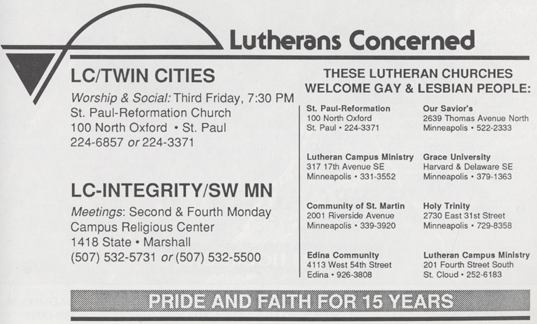Difference between revisions of "Lutherans Concerned"
m (Protected "Lutherans Concerned" [edit=sysop:move=sysop]) |
|||
| (One intermediate revision by one other user not shown) | |||
| Line 45: | Line 45: | ||
<small>(6)</small> ''Ibid.'' | <small>(6)</small> ''Ibid.'' | ||
| − | <small>(7)</small> | + | <small>(7)</small> "Lutherans Approve Gay Ministers." www.upi.com, 8/21/2009. http://www.upi.com/Top_News/2009/08/21/Lutherans-approve-gay-ministers/UPI-57371250871240/ Retrieved 3/26/2010 |
Part of [[Minneapolis/St. Paul, MN: 100 Queer Places in Minnesota History, (1860-1969), (1969-2010)]] | Part of [[Minneapolis/St. Paul, MN: 100 Queer Places in Minnesota History, (1860-1969), (1969-2010)]] | ||
Latest revision as of 11:25, 1 May 2010
100 Oxford Street North, St. Paul, MN (1974-Present)
Lutherans Concerned ad from the 1989 Twin Cities Pride Guide.
Courtesy of the Jean-Nickolaus Tretter Collection.
Stereotypes present Minnesota’s dominant culture as a Scandinavian German/Lutheran’s paradise—this was overwhelmingly the case until demographic changes in the 1960s brought new religions to the Twin Cities. Even in 1990, the Upper Midwest region contained 4 states with the highest percentages of Lutheran individuals in the United States.
Lutherans Concerned for Gay People organized in 1974 amid an ugly atmosphere of antigay church rhetoric. Eight years before, in 1966, the Lutheran Church issued statements that identified homosexuality as “contrary to God’s will,” and further suggested that it was “warped.”(1) Rather than listen to early homophile activists, the church considered treatment and occasional “cures” as the only viable solutions to the “problem.”(2)
Diane Fraser (then 31) and Allen L. Blaich (then 23) organized the first GLBT organizations for Lutherans in the United States in 1974. With an initial meeting of a dozen and the support of little over 100, the young organization became a caucus and worked to challenge the synod’s discriminatory stance.(3) They wrote “As gay Lutherans we affirm with joy the goodness of human sexuality which God has given us...We are to be found in the pulpits and pews (and) the schools and offices of Lutheran churches and organizations throughout the land.”(4)
The organization grew in size and influence—by 1993, the Evangelical Lutheran Church in America (ELCA) began to approach the topic of human sexuality from a more loving and caring approach.(5) Unfortunately, the denomination still considered homosexuality as sinful, yet it challenged a popular saying used by “compassionate” members: “Love the sinner, hate the sin. The church noted that this phrase had a “harmful effect on gay and lesbian people and their families.” (6)
Members of Lutherans Concerned celebrated on August 21st, 2009; at the Minneapolis Convention Center, the ELCA voted 559 to 451 to allow ministers with same-sex partnerships.(7)
(1) "Gay Lutherans Fighting Bias" The Minneapolis Star, 6/27/1974.
(2) Ibid.
(3) Ibid.
(4) Ibid.
(5) Morphew, Clark. "Lutherans Find New Voice to Talk About Sexual Issues." The St. Paul Pioneer Press, 10/30/1993.
(6) Ibid.
(7) "Lutherans Approve Gay Ministers." www.upi.com, 8/21/2009. http://www.upi.com/Top_News/2009/08/21/Lutherans-approve-gay-ministers/UPI-57371250871240/ Retrieved 3/26/2010
Part of Minneapolis/St. Paul, MN: 100 Queer Places in Minnesota History, (1860-1969), (1969-2010)
